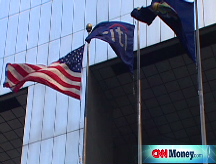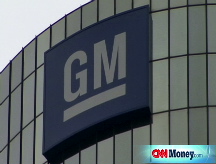Time to nationalize GM?
Some suggest that nationalizing troubled automakers would be best way to save struggling industry.
NEW YORK (CNNMoney.com) -- Perhaps the best way to fix the troubled auto industry is to treat it like a financial firm and have the government take it over.
There's been a lot of talk about nationalizing banks, but relatively little discussion about having the government take control of embattled automakers General Motors (GM, Fortune 500) and Chrysler LLC.
But some veterans of the government-coordinated rescue of six freight railroads back in the 1970's are arguing that nationalization can work with an industrial firm and might be the best course for the government to follow now.
Larry Kaufman, a former rail executive and consultant, argued in a railroad industry newsletter Monday that the U.S. Railway Association, the special government agency set up in 1974 to deal with bankrupt railroads, is a good model for saving the U.S. auto industry.
"Management of bankrupt rails were spectators. They could not fix their own companies," Kaufman wrote. "Similarly, expecting auto manufacturers' management to fix their own companies reminds one of the definitions of insanity: the same people repeatedly doing the same things but expecting different results."
The automakers have continually argued bankruptcy would hurt their chances for long-term survival because consumers wouldn't buy a vehicle from a bankrupt automaker.
But Kaufman suggested that a special government agency would help the companies continue to sell cars while they reorganize because it would assure consumers that the companies and their warranties were not about to disappear.
But even if nationalizing the auto industry answers consumers' concerns about buying cars from the firms, critics say the government is ill-prepared to fix the industry's many problems.
Critics also point to Conrail, the private company created by the USRA to run freight railroads in the Northeast until 1997, as a cautionary tale. That's because the government only got back about $3 billion of the $8 billion it pumped into the railroads.
But John Barnum, a former deputy secretary of transportation who was involved with the creation of the USRA and Conrail, said taxpayers are likely to lose an even greater percentage of the loans already made or requested by GM and Chrysler unless the government takes a more direct role in restructuring the companies.
"You can not let the people who mucked it up to this point continue to get tax dollars," said Barnum, now an attorney at with McGuireWoods LLP.
He argues that a government agency making the decisions during a bankruptcy reorganization would work better than having the companies trying to reorganize themselves.
"That's the only way to get the industry slimmed down to where it can make money again," he argues. "The bankruptcy courts can't do it alone."
One auto analyst thinks the idea of nationalization, while not perfect, may be the best of the available options -- especially since the government has already committed billions of dollars to trying to save GM and Chrysler.
"We're paying for it anyway," said Kevin Tynan, auto analyst with Argus Research. "Would it be that much worse than the people now at GM continuing to make the decisions?"
Still, nationalizing GM and Chrysler would hardly be foolproof, and that the comparison to Conrail may not be completely relevant.
Many skeptics point out that even though Conrail was largely a success, another government-run railroad, Amtrak, continues to be an ongoing financial drain on taxpayers.
Critics also point out that while Conrail faced growing competition from truckers, it had an essential monopoly in its territory for shippers who depended upon rail. GM and Chrysler, on the other hand, face fierce competition from other automakers for every sale.
"Do you think that creating new automobiles at a time of rapid change is comparable to running a railroad?" said University of Maryland professor Peter Morici, a critic of the federal bailouts of the auto industry.
In addition, there are already numerous examples of overseas governments that took control of auto companies, only to see them ultimately fail. That was the case with British Leyland, the former owner of Jaguar and Land Rover, which received billions of pounds in financial support from 1974 to 1988.
Others worry that the Obama administration's goals for the industry, such as improving fuel economy and reducing greenhouse gases, could make turning around the companies even more difficult. That's because electric vehicles are not likely to be the most profitable offerings in the short-term.
"You don't want people with a government agenda running a business," said Efraim Levy, auto equity analyst with Standard & Poor's.
But Argus' Tynan said mandates for greener cars are going to be there anyway, whether or not the government takes control of the companies. With that in mind, he said nationalization of GM and Chrysler may be the best of a number of bad choices facing the industry and federal policymakers.
"Anything where you have the most clarity about the outcome is probably the best bet," he said. "Right now we're just throwing money at the problem." ![]()



